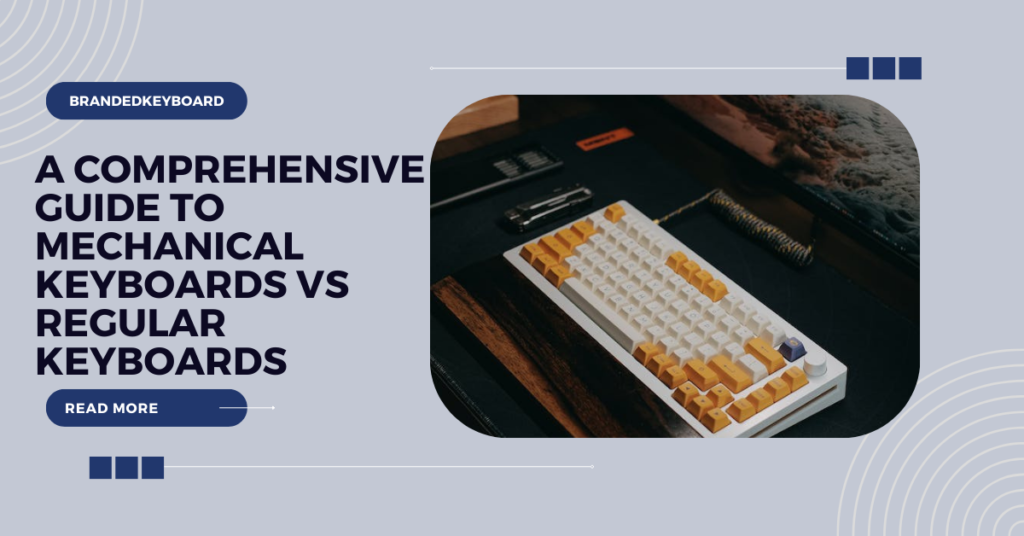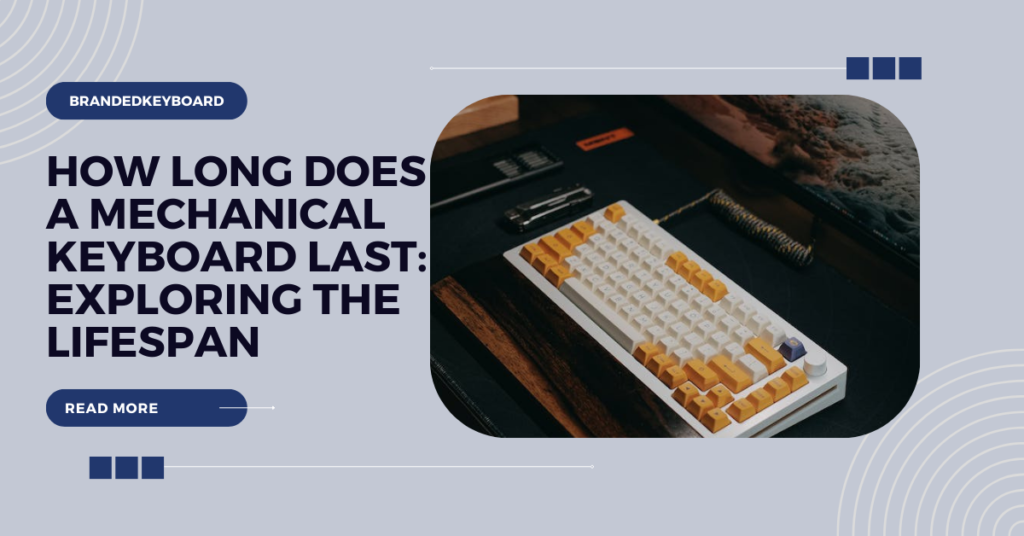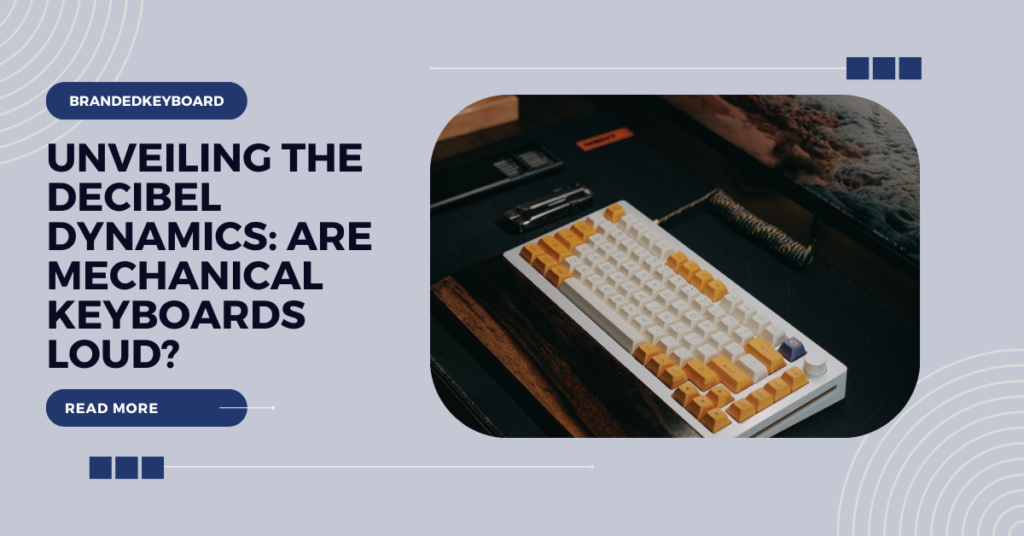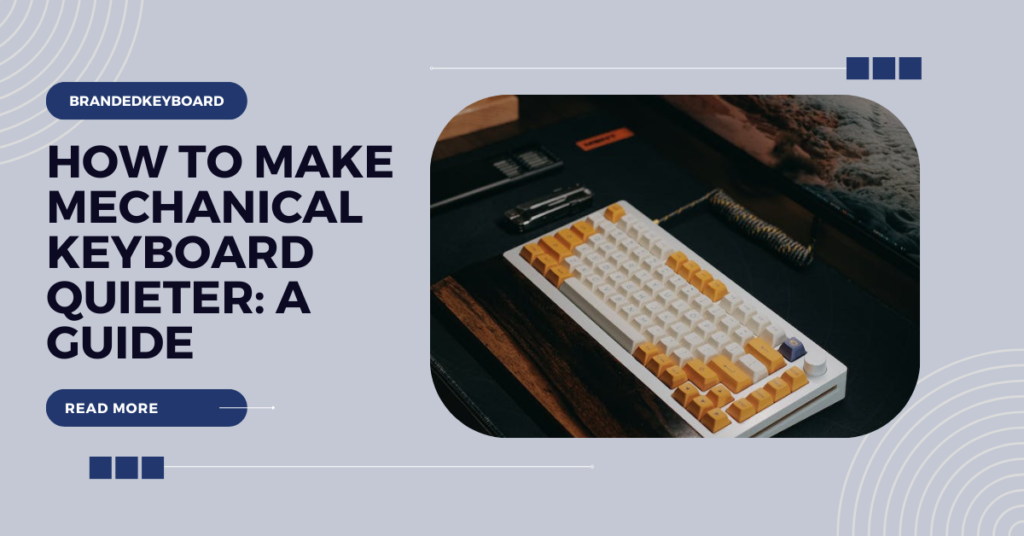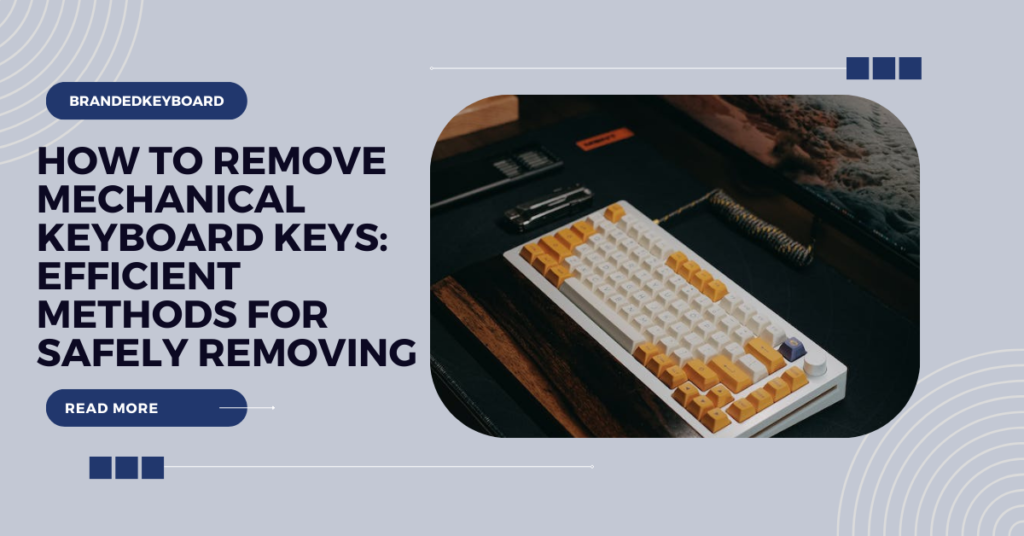In the digital age, keyboards play a pivotal role in our daily computing experiences. As the primary interface between users and computers, choosing the right keyboard is crucial. This guide aims to delve into the nuances of keyboard types, focusing on the two main categories: Mechanical and Regular. Regular keyboards, encompassing both membrane and scissor-switch varieties, are prevalent due to their cost-effectiveness and low-profile design. Membrane keyboards, often discussed in the context of Mechanical Keyboards vs Regular Keyboards, utilize a pressure pad beneath the keys, registering keystrokes when the pressure is applied.
Meanwhile, scissor-switch keyboards, another aspect to consider in the comparison of “Mechanical Keyboards vs Regular Keyboards,” employ a scissor-like mechanism for key actuation, providing a slim and sleek design. Understanding the differences between mechanical and regular keyboards is crucial for making an informed choice based on your preferences and usage requirements.
While regular keyboards boast affordability and aesthetics, they fall short in delivering tactile feedback. The lack of distinct physical feedback impacts the typing experience, often leading to slower and less accurate typing. Furthermore, standard consoles will generally have a more limited life expectancy because of the mileage related with their plan.
On the opposite finish of the range, mechanical consoles are acquiring ubiquity for their complex plan and prevalent execution. Utilizing individual mechanical switches beneath each key, these keyboards offer tactile and audible feedback, enhancing the typing experience significantly. The keycap construction, often with customizable materials, further contributes to a personalized and comfortable typing feel.
The advantages of mechanical keyboards extend to durability and longevity. Mechanical switches are known for their robustness, with some models capable of enduring millions of keystrokes. This makes them a long-term investment, offsetting the higher initial cost.
Despite their advantages, mechanical keyboards aren’t without drawbacks. The cost factor can be a deterrent for budget-conscious consumers, and the audible click sound, while appreciated by some, may be considered noisy in shared spaces.
Understanding the stark differences between these keyboard types is essential for making an informed decision. The subsequent sections will delve deeper into the intricacies of regular and mechanical keyboards, analyzing their typing experiences, gaming performances, considerations for purchase, and maintenance and durability.
Understanding Regular Keyboards
Definition and Typology
Regular keyboards, encompassing membrane and scissor-switch varieties, are widespread due to their affordability and slim design. Membrane keyboards, employing a pressure pad beneath the keys, register keystrokes upon pressure application. In contrast, scissor-switch keyboards use a scissor-like mechanism for key actuation, delivering a sleek and low-profile design.
Advantages of Regular Keyboards
Regular keyboards excel in cost-effectiveness and aesthetics. Their production processes and materials make them more affordable, catering to a broader consumer base. The low-profile design not only contributes to a visually appealing layout but also enhances adaptability to various environments.
Nonetheless, the expense viability includes some major disadvantages, basically as restricted material criticism. The lack of a distinct physical response impacts the typing experience, potentially slowing down typing speed and reducing accuracy. Besides, normal consoles will quite often have a more limited life expectancy because of the mileage related with their plan.
Limitations of Regular Keyboards
Regular keyboards fall short in providing the tactile feedback essential for an efficient typing experience. The absence of this feedback hampers muscle memory development and may lead to discomfort during extended typing sessions. Additionally, the durability of regular keyboards is compromised due to the inherent design, making them less suitable for heavy use over an extended period.
Understanding the characteristics and limitations of regular keyboards sets the stage for a comprehensive comparison with their mechanical counterparts in the subsequent sections. The tactile and auditory advantages of mechanical keyboards make them an intriguing alternative for users seeking a more immersive and durable typing experience.
Unveiling Mechanical Keyboards
Definition and Intricate Characteristics
Mechanical keyboards, in contrast to regular ones, employ individual mechanical switches beneath each key. These switches, often based on designs like Cherry MX or Romer-G, provide distinct tactile feedback and audible clicks. Keycaps in mechanical keyboards are also noteworthy, with customizable materials that contribute to a unique and personalized typing experience.
Advantages of Mechanical Keyboards
The superiority of mechanical keyboards lies in their tactile and audible feedback, offering a more engaging typing experience. The distinct feel of each keypress provides users with a sensory connection, enhancing typing speed and accuracy. Key actuation force, a critical factor, is customizable, allowing users to choose switches that match their typing preferences.
The enhanced typing experience extends to durability. Mechanical switches are known for their longevity, with some models capable of enduring tens of millions of keystrokes per key. This durability transforms mechanical keyboards into a long-term investment, offsetting the higher initial cost.
Limitations of Mechanical Keyboards
Despite their advantages, mechanical keyboards come with a higher price tag. The intricate design of mechanical switches, along with customizable keycaps, contributes to elevated manufacturing costs. While the investment pays off in durability and typing experience, the upfront expense may deter budget-conscious consumers.
Another notable aspect is the increased noise level. The audible click of mechanical switches, while appreciated by many enthusiasts, may be disruptive in shared or quiet environments. Some mechanical keyboards offer silent switch alternatives to address this concern, but it’s an important consideration for potential users.
Understanding the intricacies of mechanical keyboards sheds light on their appeal, especially for users who prioritize a tactile typing experience and longevity.
Typing Experience
Detailed Comparison of Typing Experience
When it comes to typing, the experience can significantly impact user productivity and satisfaction. In the realm of mechanical vs. regular keyboards, key actuation force, key travel distance, and response time are critical factors differentiating the two.
Key actuation force, or the amount of force required to register a keypress, varies between mechanical and regular keyboards. Mechanical keyboards allow for customization, enabling users to choose switches with actuation forces that suit their preferences. This results in a more personalized and comfortable typing experience. In contrast, regular keyboards lack this level of customization, offering a consistent but often less satisfying keypress.
Key travel distance, referring to how far a key needs to be pressed for a keystroke to register, also varies. Mechanical keyboards typically provide a more pronounced and customizable key travel distance, contributing to a tactile feel that some users find superior. Regular keyboards, with their membrane or scissor-switch mechanisms, often have a shallower key travel, which may be preferred by those who appreciate a softer touch.
Response time, the speed at which a keypress is registered on the screen, is crucial for both general typing and gaming. Mechanical keyboards generally offer faster response times due to the nature of their switches. This can be particularly advantageous in gaming scenarios and for users who demand quick, precise typing.
Understanding these nuances in typing experience allows users to make informed decisions based on their preferences and requirements. Whether one prioritizes customization, a specific feel, or enhanced responsiveness, these factors contribute to the overall typing experience and should be considered when choosing a keyboard.
Impact on Typing Speed and Accuracy
The relationship between keyboard type and typing proficiency is multifaceted. Mechanical keyboards, with their tactile feedback and customizable features, often contribute to increased typing speed and accuracy. The distinct feel of each keypress allows users to develop muscle memory more effectively, leading to a smoother and more efficient typing experience.
Regular keyboards, while functional for general typing, may hinder the development of muscle memory due to the lack of tactile feedback. This can bring about more slow composing speeds and possibly more blunders, particularly for clients who participate in broad composing errands.
In the context of professional use or scenarios where typing efficiency is paramount, the choice between mechanical and regular keyboards can make a significant difference. While personal preferences play a crucial role, users seeking optimal performance may find that the tactile advantages of mechanical keyboards translate into improved typing speed and accuracy over time.
Gaming Performance
Analysis of Mechanical Keyboards for Gaming
The gaming landscape demands precision, responsiveness, and a customizable interface, making mechanical keyboards a preferred choice for many gamers. The unique characteristics of mechanical switches contribute to an enhanced gaming experience.
1. Response Time and Precision
Mechanical keyboards shine in gaming scenarios due to their fast response times. The individual switches register keypresses more quickly than their counterparts in regular keyboards, providing a crucial edge in fast-paced games. The tactile feedback of mechanical switches also allows gamers to feel each keypress, aiding in precise control during intense gaming sessions.
Customization is another key aspect. Many mechanical keyboards offer programmable keys and macros, allowing gamers to tailor their keyboard setup to specific game requirements. This flexibility empowers users to optimize their gaming experience, potentially boosting performance in competitive environments.
2. Customization Options
Beyond response time, the customization options in mechanical keyboards contribute significantly to gaming performance. RGB lighting, customizable keycaps, and dedicated macro keys are common features that enhance the gaming aesthetic and functionality. The ability to fine-tune the keyboard to individual preferences and game requirements is a valuable asset for serious gamers.
Regular Keyboards in Gaming Scenarios
While regular keyboards are functional for gaming, they generally lack the performance-oriented features that make mechanical keyboards a favorite among gamers. The membrane or scissor-switch mechanisms in regular keyboards may not provide the same level of responsiveness as mechanical switches, potentially impacting gaming precision.
For casual gamers or those not seeking highly customizable options, a regular keyboard may suffice. However, for competitive gamers or those who prioritize a responsive and personalized gaming setup, the advantages of mechanical keyboards become evident.
Understanding the specific gaming requirements and preferences is crucial when choosing between mechanical and regular keyboards for gaming. The next section explores considerations for purchase, delving into budget considerations, user preferences, and intended use to guide prospective buyers in making an informed decision.
Considerations for Purchase
Budget Considerations
One of the primary considerations when choosing between mechanical and regular keyboards is the budget. Mechanical keyboards, with their intricate design and customizable features, generally come with a higher price tag. This forthright expense, be that as it may, should be seen with regards to long haul esteem.
While regular keyboards are more budget-friendly, their shorter lifespan and potential limitations in typing and gaming experiences may necessitate more frequent replacements. The decision between mechanical and regular keyboards should factor in not just the initial cost but also the overall value and longevity.
User Preferences
User preferences play a pivotal role in the decision-making process. Some users may prefer the quieter and more subtle typing experience of regular keyboards, especially in shared or quiet environments. Others may prioritize the tactile feedback and customization options of mechanical keyboards, valuing the enhanced typing and gaming experiences they offer.
Intended Use
Consideration of the intended use, particularly when comparing Mechanical Keyboards vs Regular Keyboards, is crucial. For general typing tasks, regular keyboards may suffice, especially if budget constraints are a primary concern. Nonetheless, for clients who participate in broad composing or gaming, the advantages of mechanical consoles, for example, upgraded toughness, a fantastic composing experience, and further developed gaming execution, may offset the underlying expense. Understanding the specific demands of your tasks and the features offered by each type of keyboard is pivotal in making a well-informed decision that aligns with your preferences and requirements.
Balancing budget considerations, user preferences, and intended use forms the foundation for choosing the right keyboard. The final section explores maintenance and durability, providing insights into the lifespan of mechanical and regular keyboards, along with practical tips for upkeep.
Maintenance and Durability
Lifespan of Mechanical vs Regular Keyboards
The durability and lifespan of a keyboard are significant factors in its overall value. Mechanical keyboards, with their individual switches, are known for their robustness. High-quality mechanical switches can endure tens of millions of keystrokes per key, ensuring a prolonged lifespan that surpasses regular keyboards.
Regular keyboards, relying on membrane or scissor-switch mechanisms, generally have a shorter lifespan. The continuous pressure on the membrane or scissor mechanism during keypresses can lead to wear and tear over time, potentially resulting in a decline in performance.
Cleaning and Maintenance Tips for Each Type
Proper maintenance can extend the lifespan of both mechanical and regular keyboards. For regular keyboards, cleaning involves removing keycaps and cleaning the membrane beneath. This should be done carefully to avoid damaging the delicate components.
Mechanical keyboards, with their individual switches, offer an advantage in terms of ease of cleaning. Keycaps can be removed, and the exposed switches can be cleaned more thoroughly. Compressed air can be used to remove dust and debris, ensuring smooth and reliable performance.
Regular cleaning, regardless of keyboard type, is essential to prevent the buildup of dirt and debris that can compromise performance. Additionally, avoiding spills and keeping the keyboard in a clean environment can contribute to long-term durability.
Conclusion
In conclusion, comprehending the maintenance requirements and durability of both Mechanical Keyboards vs Regular Keyboards is crucial for making an informed purchase. The thorough investigation of these perspectives, alongside the nitty-gritty experiences provided in the former segments, equips clients with the information needed to pick the keyboard that best aligns with their preferences, budget, and usage patterns. Whether you prioritize the customizable features and tactile feedback of mechanical keyboards or opt for the cost-effectiveness and low-profile design of regular keyboards, understanding the nuances between the two types is essential for a satisfactory keyboard choice.
Read More: Simplifying the Process of Connecting Your Wireless Keyboard to Your iPad
FAQs
Mechanical keyboards offer distinct advantages over normal keyboards, such as a tactile and audible feedback, customizable key switches, and enhanced durability. The preference for mechanical or normal keyboards depends on personal preferences and specific use cases.
Despite their benefits, mechanical keyboards may have some drawbacks. These include higher cost, increased noise due to tactile switches, and a heavier weight. Additionally, some people may find the typing experience less comfortable than with membrane keyboards.
The impact on health depends on individual preferences and sensitivities. Mechanical keyboards with ergonomic designs can provide a more comfortable typing experience and reduce the risk of repetitive strain injuries (RSI) compared to some normal keyboards. However, it’s essential to consider personal comfort and typing habits.
The need of a mechanical keyboard relies upon your particular necessities and inclinations.If you prioritize tactile feedback, durability, and customization options, a mechanical keyboard may be a worthwhile investment. However, for general use and casual typing, a normal keyboard might suffice. Consider your typing habits, budget, and the features that matter most to you when making a decision.
